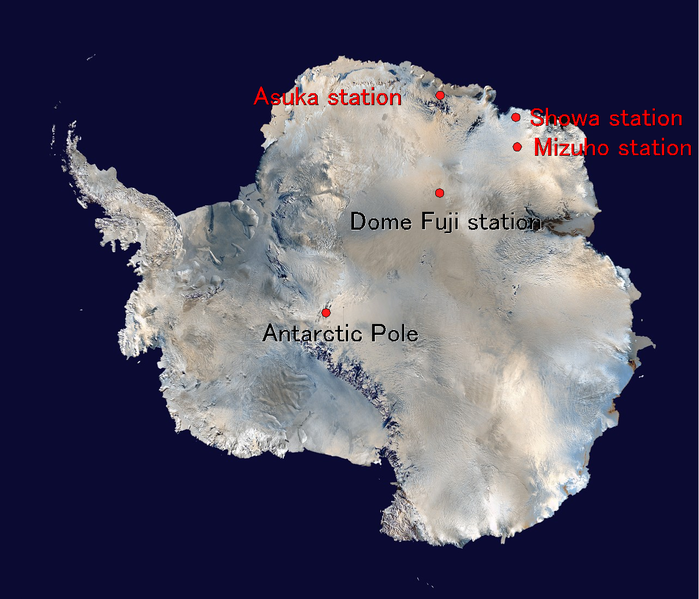The German language Voice of Russia here wrote yesterday that US scientists had recorded, by satellite, a new all-time record low of -91.2°C in Antarctica. The reading was taken at the Japanese research station Dome Fuji, 3786 meters above sea level in 2004. The old record was -89.2 set in 1983.
Where’s the warming!
“NSIDC prepared to make public”
The NSIDC plans to make this public at the coming AGU meeting, reports the English-language Russian RT News.
Credit: Forestfarmer, Creative Commons Attribution-Share Alike 3.0 Unported license
The French language Voice of Russia is also reporting the story.
The English-language Russian RT News here writes about the new all-time record low for the planet Earth as well, but states that it is also being disputed by one Russian scientist. The RT (my emphasis):
American researchers from the US National Snow and Ice Data Centre (NSIDC) prepare to make public satellite temperature measurements data which maintains that a record temperature of -91.2°C was registered in Antarctica on August 3, 2004, near the Japanese Dome Fuji station, situated on the Valkyrie Dome in the heart of the White Continent.”
According to the RT article, the NSIDC will present the report for the American Geophysical Union’s annual meeting in San Francisco. The report states that the “winters of 1997, 2001, 2003, and 2004 showed several temperature minima below -90°C.”
As mentioned, the record is being challenged by at least one scientist. The head of the Russian Antarctic Expedition’s logistics center Vyacheslav Martyanov disputes the readings, and told RIA Novosti that: “It is incorrect to declare a temperature record based on satellite data,” adding:
Air temperature is measured according to standards, at the height of 2 meters above the ground, like they do at meteorological observing stations, therefore recognizing a temperature measured by remote sensing is unrealistic.”
Read more here.
Whether the new temperature record gets officially recognized or not is not sure at this point. But one thing is clear: Things aren’t warming up at all in Antarctica!






They need to “homogenize” the record first.
I think that means: Put it into a blender with all the other data and turn it to maximum speed until there’s an ooze of uniform data. 🙂
Seriously though, altitude correction (for adiabatic lapse rate) adds about 22⁰C to that record to bring it down to a sea-level temperature.
Yes, its cooling down in the Southern Hemisphere. So much that we don’t need a thermometer to tell us. There’ll be usual heat waves this summer if the weather is dry enough.
This is of course, all normal variability.
Maybe this was the reason Prince Harry was recalled from his trek………….of course the Royal Family wouldn’t want to admit it was too cold for him to walk to the South Poles to “save the penguins” from Global Warming!
There are no penguins at the South Pole.
Penguins are smart enough to stay near the shore; where it’s relatively warm.
It has nothing to do with smartness (which in penguins is restricted to those who work for Pixar or fight Wallace & Gromit, i.e. not native to the sixth continent). They simply are not very keen on flying & would have to walk to the Pole. On an empty stomach.
“Things aren’t warming up at all in Antarctica!”
And it’s currently summer down there.
[…] heeft het in de bergen op 5 december 20cm gesneeuwd. En op Antarctica is vanuit de satelliet een nieuw absoluut kouderecord van -91,2°C gemeten. Dat was 2004 maar de meting wordt nu pas […]
In August 10, 2010 it reached -93.2C,
https://twitter.com/NASAGoddard/status/410178932231524352/photo/1
and
http://www.nasa.gov/content/goddard/nasa-usgs-landsat-8-satellite-pinpoints-coldest-spots-on-earth/#.UqaQWdFM1n9
“Bernd Felsche-9. Dezember 2013 at 17:25
They need to “homogenize” the record first…
Yes, its cooling down in the Southern Hemisphere. So much that we don’t need a thermometer to tell us. There’ll be usual heat waves this summer if the weather is dry enough …”
Why “cooling” would cause “unusual heat waves”? Thanks!
He said “usual” ; not “unusual”.
It will not count as a record because it was a satellite reading.
However, it won’t be in the Guinness Book of World Records because these were satellite measured, not from thermometers, Scambos said.
So Vostok keeps it’s record for now.
http://www.weather.com/news/antarctica-sets-cold-record-20131209
AP couldn’t be bothered to find a picture of the polar icecap, instead showing some glacier with water running through it.